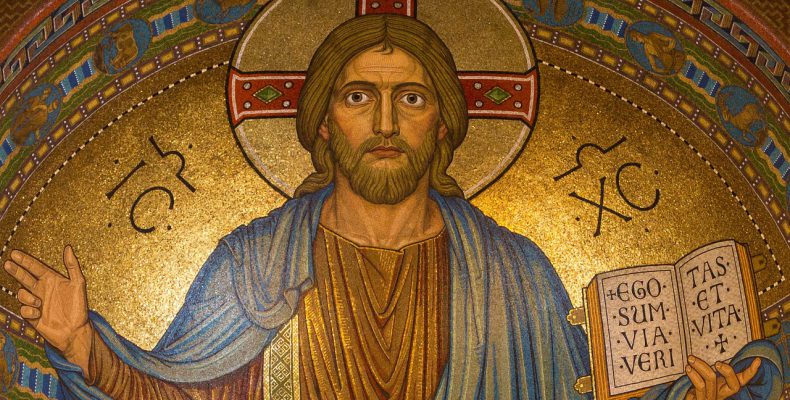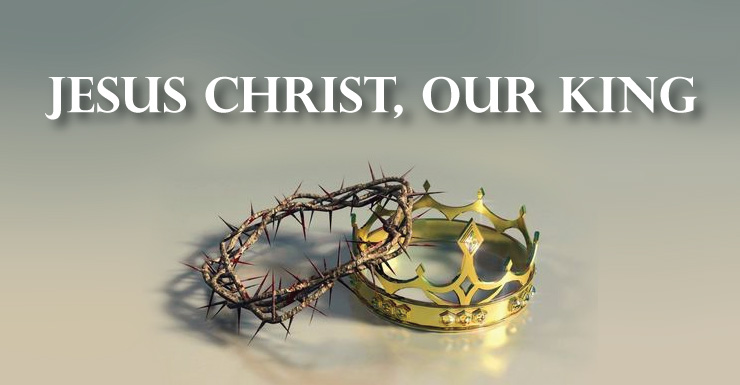Reflection for the 34th Sunday. Year B. 2018
– By Fr Ugo Ikwuka
Archway, London
This is the last Sunday of the church’s calendar. Next Sunday starts the new liturgical year with the First Sunday of Advent.
It is fitting that the church’s year is crowned with the Feast of Christ the King, which in a way sums up all that we have learned about Jesus through the year.
The feast celebrates that the Jesus we have heard teach, heal, liberate and challenge people is our Lord and King. He is the visible presence of God in our midst. He is the Alpha and Omega; the Word through whom all things were created in the beginning, and the final goal for all creation. He is the One who is and who was and who is to come.
However, as he stands before Pilate in today’s Gospel, accused of blasphemy for equating himself with God, Jesus clarifies that he is king but his kingship and kingdom are not like those of this world. He is not a political king like Herod over whom Pilate, the Roman Governor of Palestine has control.

He is a king who “bears witness to the truth” as he told Pilate, truth that enlightens people to the real meaning of life as he demonstrated in his words and action; a vision of life that responds to the deepest hopes and longings of peoples everywhere.
As beautifully described in the Preface to the Eucharistic Prayer of today’s feast, his is “an eternal and universal kingdom; a kingdom of truth and life, a kingdom of holiness and grace, a kingdom of justice, love and peace.”

To embrace this view of life is to live life to the full. It is not necessarily a life without pain or suffering; in fact, pain and suffering may be part of the process of realizing this kingdom as demonstrated by his own life and by the lives of many saints.
How does the kingship/ kingdom of Christ differ from those of the world?
First, while the kings of this world rule from palaces adorned in gold, Christ reigns from human hearts, which he desires to be transformed, to be golden.
Secondly, while the kings of this world grow and expand their kingdoms by conquering rival kingdoms, the kingdom of God grows when we rather conquer the evils in our hearts; selfishness, corruption, greed, etc.
Thirdly, the kings of this world exercise executive or coercive powers. They are served in shifts by retinue of aides and servants. They receive tributes and royalties. In fact, in some kingdoms, the entire “commonwealth” belongs to the Royal Majesty.
In Christ however, we have a king who rather gives and gives to the scandalous extent of totally emptying himself, hanging naked on the cross. Yet, that moment of utter degradation is in truth the most glorious moment in his life because it is the moment when he gave the uttermost proof of his love – Greater love has no man than to lay down his life for his friends (John 15:13).

To sincerely profess Christ as our King is to have Christ as the Lord both of our private and public lives.
It is to be able to say with St. Paul that it is no longer I who live, but Christ who lives in me. To say that Christ is the Lord of my personal life means that I will feel comfortable doing whatever I am doing in my private life with Christ right next to me. If not, then he is not the king of my personal life and I must stop whatever I am doing that will make me feel uneasy with Christ watching.
To say that Christ is the Lord of your family life means that you treat everyone in your family as subject of infinite respect and dignity not simply as means of achieving your selfish ends. There can be rape even within a marriage when a spouse insistently satisfies his or her orgies without any consideration for the other’s disposition. That means treating the other as a means not as an end. If we welcome Christ only into our sitting room and not into our bedrooms, then, he isn’t our king.

To say that Christ is the Lord of your professional life means that you don’t draw boundaries between your job and your spiritual or religious life. It means that you have to quit a job or practice that is fundamentally immoral. In many markets in Nigeria, trading is suspended at 12noon as people cluster to pray the angelus. At the end of the prayers, some return to their shops to continue the swindling of hapless customers, with some selling fake products that could lead to people’s death.
Counting on such “gains” of corruption, many detest Christianity especially the Catholic faith; they consider it a hindrance because it pricks the conscience and can leave people guilt-ridden. They imagine that it is more liberating being of no faith. But this demonstrates a mistaken sense of Jesus and his mission because no one is more free than the one who has seen and embraced the liberating truth of life as revealed by Christ the King who makes us aware of the things that really matter thereby relieving us of the inordinate desires that lead us astray.




